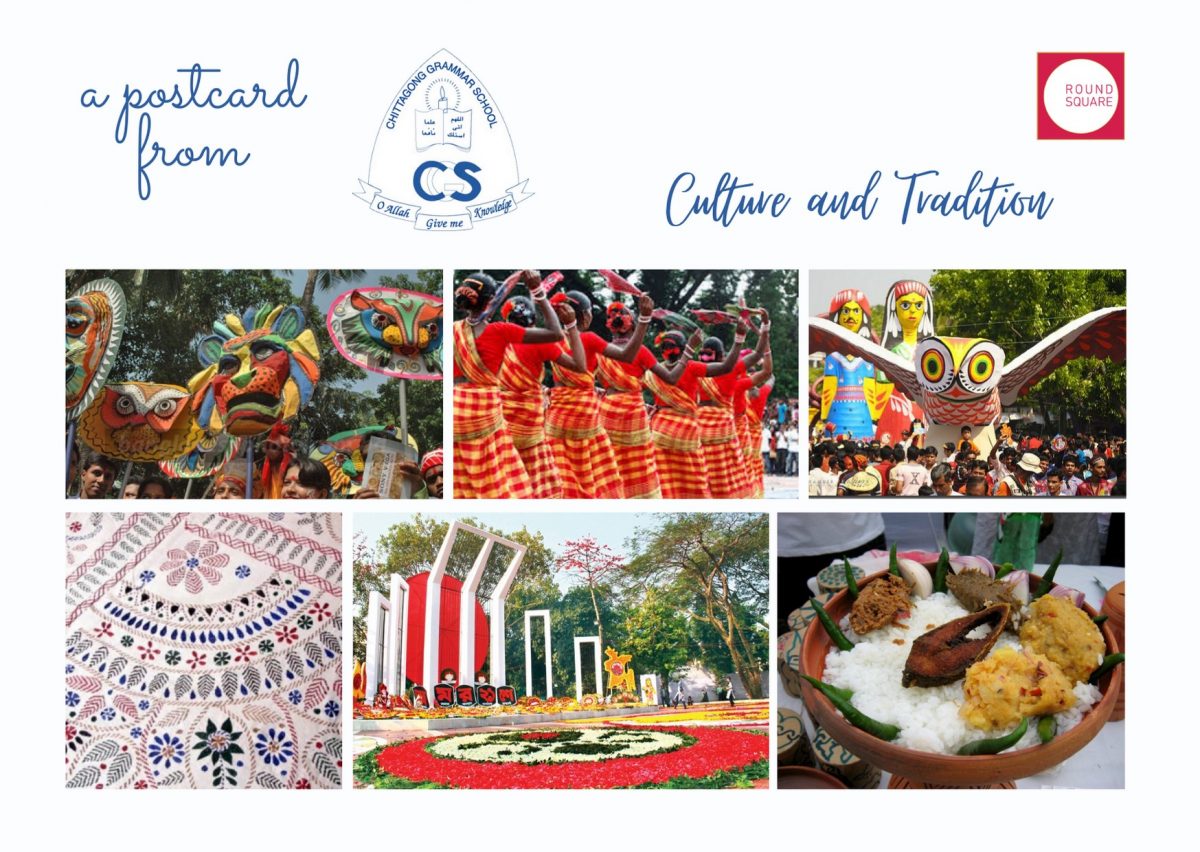A Postcard from Chittagong Grammar School: Culture and Tradition
Posted: 05 April 2021

Overview
Chittagong Grammar School led a RS Zoom Postcard on the topic of “Culture and Tradition”. More than 100 students from 18 schools joined the call, dialing in from India, Bogota, Chile, China, and Australia.
During the 90-minute call Chittagong students shared some insights into Bangladesh and led Baraza discussions around differences and similarities around the world in language, cuisine, hip-hop culture, art and festivities, culture and tradition, and paranormal activity.
In advance of the call, participants sent in pictures of architecturally significant landmarks in their country and of dishes they have cooked that are of cultural significance in their part of the world. They also shared short stories they had written about encounters with spiritual beings. This eclectic mix of topics inspired some lively discussions during baraza breakout sessions. Mini ice-breaking sessions with fun games and quizzes were offered to keep participants relaxed and focused on visual and auditory learning, rather than reading off screens, to ensure a far more interactive session overall.
Planning:
The student organizing team started planning well in advance and divided up tasks and topics to cover on Bangladesh. Students gathered examples of Nakshi Katha and Haath Paakha, and took their own photos of the country’s majestic flora and fauna, each of the team members went above and beyond to ensure that the participants truly experienced the magic of Bangladesh.
They did extensive research on their respective topics, double-checked facts, and took advice from history experts to ensure the delivery of accurate information.
The team regularly updated their counselors and the Round Square representatives to avoid miscommunications of any sort. Holding countless meetings, reading well-trusted sources, and looking for the best pictures to truly justify our country and its beauty was consistent throughout the six months.
They also held brainstorming sessions to find fresh and innovative ice breaking games to help such a diverse group of people relate to Bangladesh and enjoy the 90 minutes.
Details:
The greetings, introduction, and basic overview were done in the central room where everyone was together. Mutasim was in charge of “Basic Overview and Introduction”, “Culture and Tradition”, and “Signing Off” where he gave everyone a general idea about Bangladesh along with its geology, culture and traditions, wrapping it up with some fun facts.
Leaders assigned participants to five separate Baraza groups – Brava, Clement, Empathy, Intrepid, and Unapologetic. In the breakout rooms, each of the leaders led a different topic:
- “Art and Festivities”, where delegates talked about the country’s impressive architecture and rich cultural art diversity, along with different methods of painting and expressing ourselves. We explored famous tribal dances and compared today’s art with art from decades ago. The numerous festivals Bangladeshis like to celebrate each year, both religious and regional, were shown with the help of videos. Different folk art and hand-embroidered pieces were also showcased.
- “Hip Hop Culture Around The World” explored the origins of Hip Hop culture in Bangladesh and its pioneers. The students leading this discussion is a rapper and showcased his talents in the Bangla language. He talked about the growth and spread of hip hop culture and held an interactive session where the participants put together a rap verse.
- “Cuisine of Bangladesh”, talked about the food dishes dearest to Bangladeshis and the must-haves when visiting Bangladesh. Along with the origins of the different food, the modern take on those was shown to the participants. The participants were engaged in conversations about the similarities of our cuisine with theirs and innovative menus created here which piqued their interests.
- “Places to Visit”, discussed the natural beauty of Bangladesh and it’s flora and fauna. Rather than only telling participants about the architectural places to visit, he also focused on the natural beauties like the Sundarbans, the Chittagong Hill Tracts, the world’s longest sea beach Cox’s Bazar, the countless waterfalls, and the many different activities tourists can do. Participants showed their curiosity for surfing and hiking in particular when shown beautiful pictures of the locations. Sahir also shared his experiences in the places he mentioned that helped everyone gain a vision of Bangladesh.
- “In Our Own Mother Tongues” elaborated on the fact that the Bangla speaking people are the only citizens who have sacrificed their lives for their mother tongue. After sharing with them a brief history of how we gained Bangla as a state language and the development of the language over the centuries, she moved on to show pictures of the texts from those periods. She also discussed the different dialects of Bangladesh with the help of a detailed map and pointed out the differences between some of the dialects using audio clips dictating the same sentence. She taught them a few common phrases such as “I love you”, “how are you?”, “goodbye”, and “thank you” in Bangla. The session concluded with participants saying the phrase “Each and every language is beautiful in their own right” in their own mother tongues / dialects.
The five leaders were assigned to specific groups to start with and then circulated alphabetically after every 12 minutes to make sure each group in the breakout rooms had the chance to learn about all the topics, without the friction of them moving from one breakout room to another. In our last breakout room, all of us talked about the supernatural culture of Bangladesh, and the participants engaged in the conversation by sharing their supernatural experiences.
After the breakout room sessions ended, leaders conducted the ending segment and bade farewell to participants.
Challenges:
The biggest challenge encountered was our unstable internet connection. A few of the leaders lost their internet connection while the Postcard was in progress. However, they were prepared to tackle it if such a situation arose. Before the postcard, they had all purchased mobile data as backup. Each of them had all the presentations and content points just in case they had to hand over to someone else.
Student leaders found it a little difficult initiate conversation at first because the concepts of Bangladesh were completely new to some of the delegates. However, due to the extensive research on the regions where the participants were from, student leaders were quickly able to include them in the discussion, making them feel more comfortable and helping them relate by talking about the similarities between countries and cultures.
Impact:
Our student leaders felt that their communications skills developed significantly over the months as they worked together. They learned how to adapt and improvise when uncertain situations arose and how to maintain composure in the face of adversity. Moreover, they made new friends and learned that even though differences exist between countries, we can come together to acquire knowledge.
Overall, relationships with the participating Round Square schools deepened and leaders felt that they gained a better understanding of one another through the postcard. Both Chittagong Grammar School and Bangladesh received praise and exposure through this postcard, which was highly beneficial to the school community. Certain misconceptions others had about the country were also corrected through the event.
Advice:
- do extensive research on your topic of choice
- Expressing some facts about the participating schools and/or the countries they are from will make them feel more appreciated and acknowledged.
- Keep the subject matter and discussion topics easy-to-understand
- Work on a ‘smooth delivery’, to help keep delegates engaged and to keep the conversation flowing
- Work on communication skills to keep the session as interactive as possible will make it pleasant for all parties involved.
Author: Student Leader – Rudaba Sarwar and Faculty Member – Ruhbayna Mahmud Chowdhury
